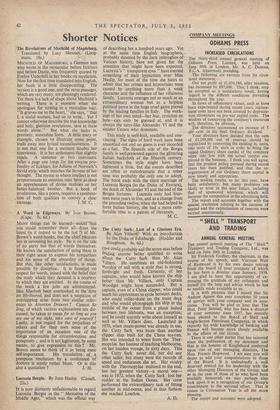IT is now distinctly unfashionable to regard Lucrezia Borgia as
the " Messalina of the Middle Ages," which was the official way of describing her a hundred years ago. Yet at the same time English biographers, probably daunted by the dark imbroglios of Vatican history, have not given her the attention that might have been expected. Lucrezia 's " transparent eyes " have exerted something of their hypnotism over Miss Haslip, for most of the time she hates to admit that her crimes and hypocrisies were caused by anything more than a weak character and the influence of her villainous family. Lucrezia emerges not so much as an extraordinary woman but as a helpless political pawn in the huge cruel game played by the leading families in Italy. The work- ings of her own mind—her fear, cynicism or hate—can only be guessed at, and it is always the satyr-like Alexander VI and the sinister Cesare who dominate.
This study is well-knit, readable and con- vincing. The signs of hard work have been smoothed out and no guess is ever recorded as a fact. The Spanish side of the Borgia family is well presented against the glittering Italian backcloth of the fifteenth century. Sometimes the style might have been lightened a little, but the events described are often so melodramatic that a sober tone was probably the only one to adopt. The book ends with the third marriage of Lucrezia Borgia (to the Duke of Ferrara), the death of Alexander VI and the end of the Borgia fortunes. Lucrezia only had four- teen more years to live, and as a change from the preceding twelve, when she had helped to form Italian history, she had a more com- fortable time as a patron of literature. M. C.


























































 Previous page
Previous page